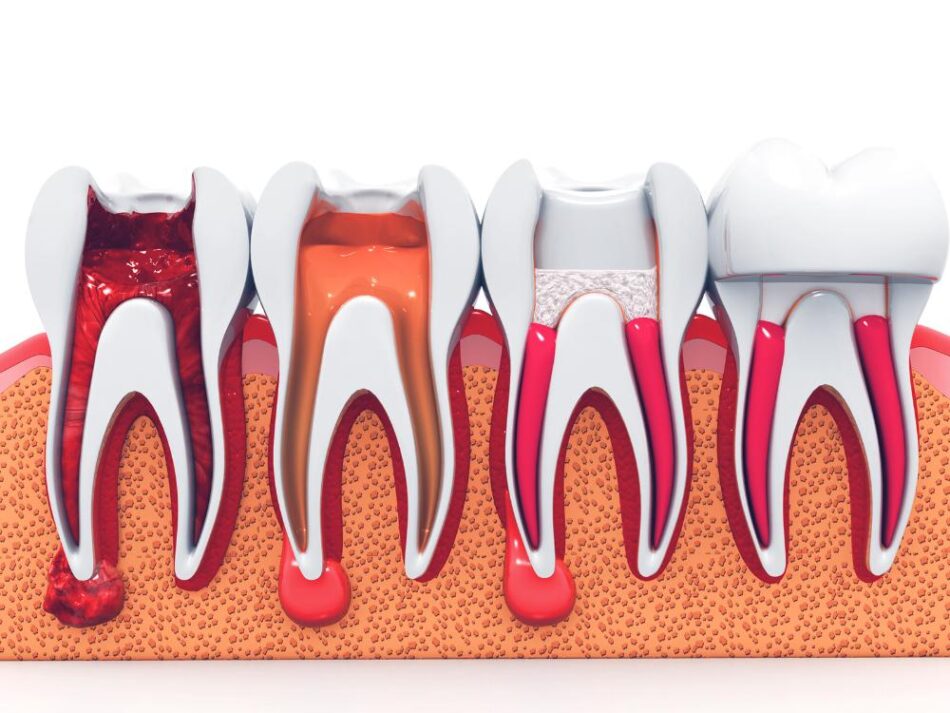Save Your Smile by Saving Your Tooth
Are you suffering from toothache or an abscess? We can help address your pain and infection with expert care.

We know that experiencing pain and the symptoms of infection can be distressing, and we’re here to provide prompt relief and expert care. Led by Dr. Paul Anast DMD, our team delivers effective root canals in Chicago. Whether you’re battling a severe toothache or signs of a dental infection, we’re here to help!
What is a Root Canal?
Root canal therapy is a common procedure that involves removing infected or damaged pulp from inside your tooth, cleaning the area, and sealing it to prevent further infection. This treatment can be crucial in saving a tooth that might otherwise need to be extracted. As a leading dentist in Chicago, Dr. Anast and his team at Kimberly Smiles are experienced in handling various types of root canal cases, ensuring that your pain is relieved promptly and efficiently.

Symptoms That You May Need a Root Canal
- Severe toothache, especially when chewing or applying pressure.
- Prolonged sensitivity or pain in response to hot or cold temperatures.
- Discoloration or darkening of the tooth.
- Swelling and tenderness in the nearby gums.
- A persistent or recurring pimple on the gums.
Why They’re Necessary
- Pain Relief: It effectively alleviates the pain caused by infected pulp.
- Saves Natural Teeth: The procedure helps save your natural tooth, avoiding the need for implants or bridges.
- Prevents Spread of Infection: Removing infected tissue prevents the spread of infection to other teeth.
- Enhances Oral Health: Root canals contribute to overall oral health and well-being.
- Cosmetic Benefits: A root canal often concludes with a crown, improving the appearance of your tooth.

What To Expect During Your Visit
Your first visit will start with a comprehensive examination with Dr. Anast, where he will review your dental history and symptoms and conduct digital X-rays to assess the extent of your infection. Afterward, he will administer local anesthesia to number the area and ensure you have a pain-free root canal experience. A dental dam is then placed to isolate the tooth and keep the area dry and free of saliva during the procedure.
To start the procedure, Dr. Anast will make an opening in the crown of the tooth to access the pulp chamber. This is crucial for removing the infected or damaged pulp. Then, using specialized dental instruments, he will carefully remove the infected pulp and thoroughly clean the canals to eliminate bacteria and prevent further infection.
The root canals are then meticulously shaped to prepare them for the filling material, which ensures that the canals are properly sealed. The cleaned and shaped canals are filled with a biocompatible material to prevent bacteria from re-entering the root canals. We also seal the opening of the tooth with a temporary or permanent filling.
We usually recommend crowns to restore your tooth to its full function, which can be done at Kimberly Smiles with our same-day crowns, to save you from having to return for another appointment at our practice.
Our Pre & Post Treatment Instructions
Things to Know Before Your Treatment
- Inform Dr. Anast of any medications you are currently taking, including over-the-counter drugs and supplements.
- Eat a normal meal a few hours before your procedure. Avoid eating immediately before your appointment to prevent discomfort.
- Brush your teeth and floss carefully to ensure the treatment area is clean. Good oral hygiene can reduce the risk of infection post-treatment.
- Ensure you are well-rested before the procedure. If you feel anxious, discuss sedation options with Dr. Anast.
Things to Remember After Your Treatment
- Stick to soft, easy-to-chew foods for a few days.
- Avoid hot beverages and foods that are too cold, as your teeth may be sensitive.
- Continue brushing and flossing, but be gentle around the treated area. Avoid vigorous rinsing or spitting for the first 24 hours to allow the tooth to heal.
- Some discomfort is normal after a root canal and can be treated with over-the-counter pain relievers like ibuprofen.
- Avoid strenuous physical activity for a few days after the procedure to minimize swelling and discomfort.
- Attend any recommended follow-up appointments to ensure proper healing and to complete any additional restorative work, such as placing a crown.
Frequently Asked Questions
How long does a root canal procedure take?
The procedure typically takes one to two visits, depending on the complexity of the case. Each session may last from 30 minutes to an hour.
Is a root canal painful?
With modern techniques and anesthesia, root canal therapy is usually no more uncomfortable than getting a filling. We use a state-of-the-art CT scanner for precise imaging during root canal procedures, ensuring optimal treatment outcomes and patient comfort.
Are there alternative therapies?
The main alternative is tooth extraction, but this often requires more complex dental procedures to replace the lost tooth, such as dental implants.
How long does it take to recover?
Recovery typically takes a few days, with possible mild discomfort that can be managed with over-the-counter pain medication.
Are there ways I can prevent root canal therapy?
Good oral hygiene, regular dental check-ups, and avoiding hard foods can reduce the risk of needing root canal therapy.
We Offer Root Canals in Chicago!
If you’re experiencing dental pain or suspect you need a root canal, don’t wait. Contact Kimberly Smiles, your trusted Wicker Park dentist, to schedule an appointment with Dr. Paul Anast. Our team is ready to provide you with the care and comfort you deserve.

A New Smile Starts Here!
Contact Us & Plan Your Visit
Kimberly Smiles offers a wide variety of dental services to cater to you and your family’s every dental need. Our unique approach to patient care has allowed us to form lasting relationships with our patients over the years.


